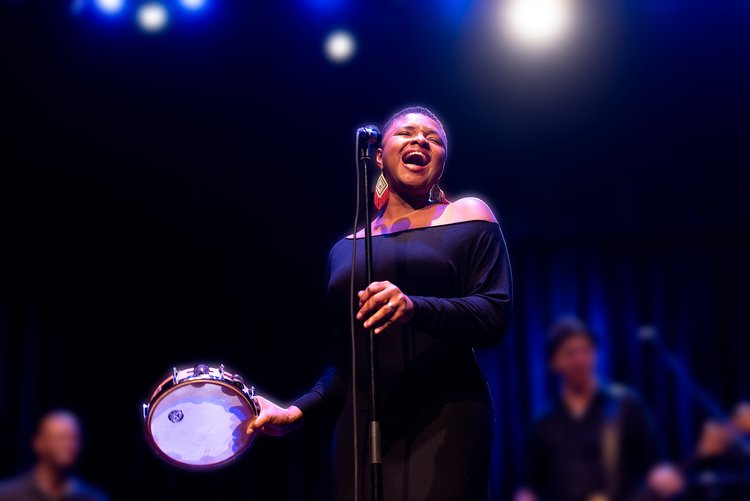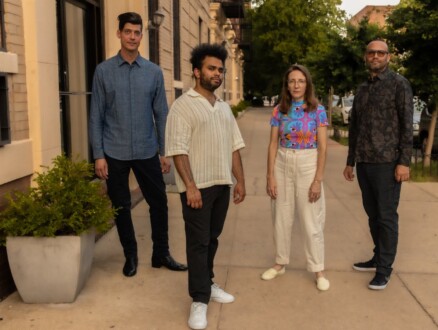The roots of Lizz Wright’s mercy

Editor’s note: On October 5, Lizz Wright appears at Strathmore’s Music Center, where she will plumb the depths of her 20-year career and continue celebrating music from her most recent release, 2024’s Shadow. Ahead of that performance, CB’s Contributing Editor Joshua Myers explores the history and meaning behind Wright’s music.
In a place like Hahira, Ga., Black sound is a mercy. It is a place where one could hear the terribleness of the scream that issued forth from Mary Turner. This exclamatory shriek that makes us blue is not the same as the sound that we create for ourselves, although there is a deep relation. The music of Lizz Wright is at once here, in the depths of that Georgia clay where we can find ourselves vulnerable in the face of terror. It is also inside the spiritual armor of the Blues; it is a mercy in a world where Mary Turner’s descendants continue to struggle with the project that required her death.
To sing another world into existence, one had to recognize and acknowledge the nature of this one that was. Wright was born into a Hahira tradition that resounded the meanings of the world through congregational music. Much like Bernice Johnson Reagon — one of Wright’s influences who also hailed from southern Georgia and was featured on her 2010 album Fellowship — in Wright’s parents’ church, you had to sing together. Also, like Reagon, Wright too would become a song leader. Singing was preparation for the shout, which was preparation for a direct intervention. And if we ever needed the Lord before, we sho’ did need him in a state which could lay claim to the invention of the most lethal forms of the chain gang. In a place that was created to serve as a barrier for Africans seeking the new Jerusalem. In a place that today has not given up its claims to control and contain and incarcerate.
But there must be a God somewhere, said this music.
This is a God that certainly emanates from an Afro-Christian ethic, and Wright was shaped by all that. But it is also a notion or an interpretation of God that casts judgment on an unjust world and a God that offers a Divine plan for a future that is not weighed down by the capture of our imagination.
We can be free now. This plea for freedom is beyond doctrine and denomination, beyond theological tradition, and especially beyond the ways that right-wing Christian and religious fundamentalisms of all sorts has overdetermined nearly all of religion’s meaning in the contemporary moment. This assertion is also a freedom in the music, in the way the emotion has to come out in order for it to “work.” So when the roots of gospel are attacked directly by those evangelical forces, something about the work being done in Black sonic tradition is revealed.
We are always running, and then sometimes we are not. Sometimes we find rest.
Yes, that intervention comes from a relationship to sound. It comes to us through singing that opens our eyes toward a just and loving force who appears through our sensuous relationship to each other in spaces and through an ancestral practice of speaking and remembering, that guides even when we do not know that we are being guided. As long as you sing, you are participating in this process of movement. Which is why every week and for every situation, Wright sang. Someone had to give rest to the spirit of Mary Turner. Even as many of us — her descendants — turn away from what this could mean.
That is one way to interpret the way Wright sings Toshi Reagon’s “No More Will I Run,” which has appeared on Wright’s last two releases. Bernice Reagon’s daughter and a close collaborator of Wright’s, Toshi Reagon’s song is, upon first listen, likely about romantic love — finding it, and never running away from it. “When the night falls/You will rest easy/Knowing there was a hiding place/Sweet like honey river rolling inside.”
Yet, this space also sounds and feels like what it could mean to create a home in a world where you are not supposed to ever feel comfort. The release of finding that space is like love, and it is also like finding community — a maroon space to gather together and exist without compromise or apology.
We are always running, and then sometimes we are not. Sometimes we find rest.
I truly mean this we. My own ancestor had to flee Georgia. What he found in neighboring South Carolina was likely more hostility — one could not outrun white supremacy in the US south at the turn of the century — but also something of what it might feel like to no longer have to run. This is a feeling we are constantly denied, but one that is still possible to find if we learn to create such spaces, even as we know nothing can ever be permanent, even as we are under duress.
Wright resonates because her sound mirrors the path so many of us have had to travel. From Black church traditions in Hahira to spaces like Churchill Grounds in Atlanta to communities like Ndugu and Nzinga, all of these moments buoyed a recording career that began with 2003’s Salt. Between 2005 and 2010, she would record three more albums culminating in Fellowship, a homage to the gospel sounds of Hahira in many respects. But then life lifed.
As Wright explained in a statement published alongside her 2015 album Freedom & Surrender, her 30s brought “an amazing and terrifying” set of circumstances that pushed her to reevaluate not only her music, but the path she was treading in life. “I realized that I had run far off the course of my scripted plans, my projections for who I’d be, what I’d be doing, and how it would feel at this point,” she wrote.
Able to fully “let go” of those “old ideals,” Wright found herself brought to the precipice of an artistic breakthrough that eventuated in her collaboration with songwriter Larry Klein and Freedom & Surrender. Instead of releasing an album of covers, she decided to write her “way out of my valley, no matter how hard or long I’d have to work for it. I’d count my steps and tell stories until I met the ridge line without borrowing anyone else’s view. This was not my hour to cover, but to uncover, and hopefully, the reveal would be worth something. I trembled in the wait for my own revelation.”
The making of Freedom & Surrender involved a kind of preparation that might make sense to women who made homes in the rough-and-tumble environs of early twentieth century Georgia, where even across gender difference incarceration and the chain gang was also a distinct possibility. One had to wake early to prepare a meal before spending the early morning hours working on chores uninterrupted by the human movements of the day. And then one had to make sure home was a welcoming place for those whose labors was exploited once that day unwrapped itself (even when many of these women were also part of the same engine of capital). Still, there was the matter of a second and third meal of the day. Water to be drawn. Clothes to be washed and mended. Gardens to be tended.
Some freedom.
Yet, there was also some beauty. In the daily chores of life, was a rhythm and beat. You could find yourself there if you listened. This was the same Black Georgia Jean Toomer saw, and then saw God, while learning to let go.
With Freedom & Surrender, this beauty of release is foregrounded. Letting go meant traveling to sit on porches and sing with friends. Letting go meant immersing herself in the waters of the Santa Monica pier as a pre-recording ritual. It meant being taking under by a guitar riff. And there was much more. The letting go was like every natural process. Like the sun setting and the tide coming in and darkness subsuming the day’s work.
In those moments she could see the music anew. As she wrote: “I could see them, unmade movies. The tide of communion would pull back and the shining pieces left could be made into anything. This is when I knew that I had, in these mosaic sessions, stumbled upon a new page of my life.”

Then in an instant, that life hung in the balance after a near-death car crash. Wright remembers “sliding across 300 yards of icecoated mountain curve. I softened my body and rested my hands in my lap. The heavy car floated silently towards a 75 foot ravine that ended with a wide band of frozen creek. “Ok” was the only thing I could get out in a sigh. I was stopped by a young bellwood tree that grew out of the bank like a hook. I slowed my breathing and meditated in suspension. About 20 minutes later, a young neighbor pulled the door open, reaching in with a strong arm to guide my climb out.”
The mystery of why Wright’s life was preserved in that moment was known only by the cosmic force that decided to give her a song. So much of her singing sounds like it was an offering back to that force. Describing how her near-death experience altered how she performed “Somewhere Down the Mystic,” Wright revealed, “when I sing the chorus, I see the gracious hole and the sweet sapling that grows over it.”
In the years since, Wright released one more major-label record — the Southern soul-soaked Grace (2017) — and moved from Asheville, N.C. to Chicago, Ill., where she now fills her days operating a restaurant called Carver 47 Food & Wellness Market with her partner Monica Haslip, as well as her own label, Blues and Greens, which released her last two records. A trained chef, Wright curates a wellness-forward menu at Carver 47 that honors the legacy of George Washington Carver by, in part, utilizing a long-honed gardening practice to offer a kind of oasis in the heart of Chicago’s Kenwood neighborhood, where the people can come to receive substance and sustenance.
This blessing of provision is refracted in Wright’s music. It is a sound conferring warmth, like a well-seasoned broth or a perfectly spiced cake. With Holding Space: Live in Berlin (2022), listeners get the magic of a live Wright set, featuring her long time touring mates: pianist and organist Bobby Ray Sparks, Jr., bassist Ben Zwerin, guitarist Chris Bruce, and drummer Ivan Edwards.
With Shadow (2024) Wright offers a moving account of reconciliation and finding a kind of settlement, a space from which one can be grounded again. Alongside tunes like “No More Will I Run,” her song “Root of Mercy” mines her Georgia foundations for memory and meaning. And finds mercy. A tribute to her recently transitioned grandmother (who in times of trouble went to pray for the family underneath an oak tree), the tune once again limns the significance of space. This time, the southern trees that may have borne strange fruit are reconceived as spaces where grandmothers escaped the chores of the day in order to beseech a higher power on our behalf.
Lizz Wright continues to make us listen to what else lives in the southern landscape. Even as we move and become more settled, there is something we will always carry with us from home, something that can keep and hold us whether we run or decide to see what the end gon’ be.





